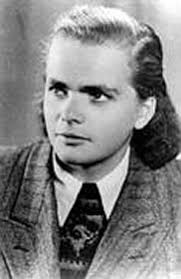Edeltraud Eckert was born in 1930 in Hindenburg, former Upper Silesia. At the age of twelve she had to flee with her family from the Red Army and ended up in Brandenburg an der Havel. There she completed her school education, took her high school diploma and, like many idealistically inclined young people, joined the „Freie Deutsche Jugend (FDJ).“ In 1949 she began studying education at the Humboldt University in Berlin, where she learned about the NKVD camps in the Eastern Zone. The NKWD was a communist secret police and responsible for the merciless persecution and annihilation of dissenting people. When Edeltraud Eckert learned that the NKVD continued to operate the concentration camps that the National Socialist regime under Hitler had set up for the imprisonment of politically persecuted citizens, she was quite shocked and deeply disillusioned by East-Germany’s socialist government, for which she had high expectations.
Together with likewise indignant study friends she took up contact with the combat group against inhumanity (KgU) in West Berlin, which maintained a search service for „disappeared,“ kidnapped or secretly arrested East Germans. Only after the fall of the GDR in 1989, was the scale of the imprisonments revealed: at least 150,000 prisoners were detained in the East German Gulag until the end of 1948. The death rate in these „special camps“ was extremely high; about 43,000 prisoners had died in 1950 and 25,000 had been deported to the Soviet Gulag. In late 1948, the remaining 28,000 prisoners were transferred to the concentration camps at Buchenwald, Sachsenhausen, and Bautzen.
Edeltraud Eckert was the contact person for the KgU and a small group of three other idealists in Rathenow (Brandenburg). In late 1949 and early 1950, this group carried out two leaflet campaigns in Brandenburg in which leaflets „For the Freedom of the Eastern Zone“ and „Against the Terror“ were distributed. There were no further actions, since all four members, including Edeltraud Eckert, were quickly arrested. After the interrogations, which took place using physical force, the four were transferred to the Soviet military tribunal in Potsdam, where they were subjected to night-long interrogations. After a trial that made mockery of all the principles of the rule of law, in secret and without the assistance of a lawyer, Edeltraud Eckert was sentenced to 25 years in prison and a labor camp. In addition, all her possessions that she owned at the time were confiscated.
In 1953, various factors, including socialist mismanagement, the forced collectivization of the peasants and the mass exodus to the West, led to food shortages, unrest and massive popular dissatisfaction with conditions in the „socialist workers‘ and peasants‘ republic.“ Finally, on June 16, construction workers in Berlin called for a general strike and a popular uprising broke out throughout the GDR, sweeping through 700 cities. The uprising, as we know, was bloodily crushed by the Soviet military, who had imposed martial law.
As a result of the uprising, the GDR penitentiaries, which were hopelessly overcrowded, offered certain benefits to the prisoners, as the official authorities were afraid that the prison inmates would show solidarity with the insurgents outside. For Edeltraud Eckert, these „reliefs“ meant that she was now allowed to keep a notebook in which she could enter her poems and compositions. She was not only a highly gifted poet, but also a talented musician and composer, who composed chorales and songs for her fellow prisoners.
Due to this fortunate circumstance, a part of the poems of Edeltraud Eckert have been conserved, because the young lyricist was permitted to put her works down on paper thanks to her good work as a tailor. However, after she was transferred to the notorious Hoheneck women’s prison in early 1954, her notebook was taken away from her again. The 24-year-old poet was now assigned to repair work, after she had injured a finger very badly on one of the obsolete sewing machines.
On January 24, 1955, there were problems with the transmission system in the sewing room. During the repair, Edeltraud Eckert’s hair was caught by a belt and her scalp was torn off. The wound was not professionally disinfected because, due to the weekend, the nurse was unreachable. In the following weeks, Mrs. Eckert languished in the prison infirmary with completely inadequate medical care until she was finally, but too late, transferred to a Leipzig prison hospital, from where she was transferred in a desolate condition to Leipzig University Surgery because of tetanus, where she died on the night of April 18, 1955.
After the poet’s sad death, her ashes, along with her book of poems and compositions, were handed over to her family without a death certificate and any further explanation. Mrs. Eckert’s sister passed on the poems to Ines Geipel, who rendered outstanding services in dealing with the history of the many forgotten poets oppressed in former East Germany. It is thanks to these two women that we have available today the poems of this highly talented poet in a beautiful edition of the “Verschwiegene Bibliothek.”
The following poems by Edeltraud Eckert were printed with the kind permission of Ines Geipel, the editor of the volume Jahr ohne Frühling. In this issue, they appear in English for the first time ever.
The poems show that Edeltraud Eckert beautifully mastered the classical forms, lied and sonnet, as well as free verse. Rhythm and tonality show a strong influence by Rilke, her favorite poet. Thematically, the poems revolve around farewell, uncertain future, missed or stolen life and an overwhelming longing for a loving person. They appear as a spiritual counterpoint to the incredibly harsh prison conditions.

